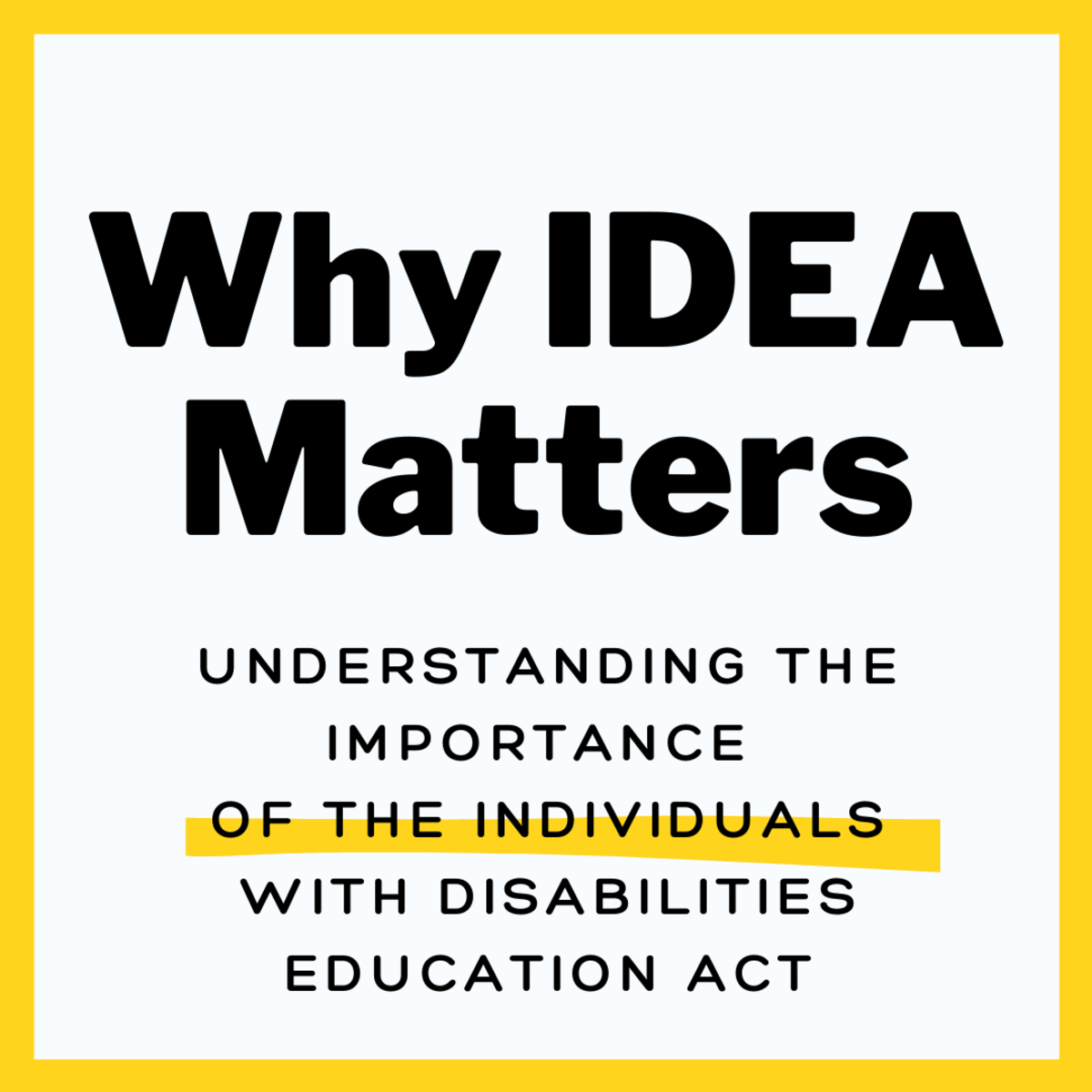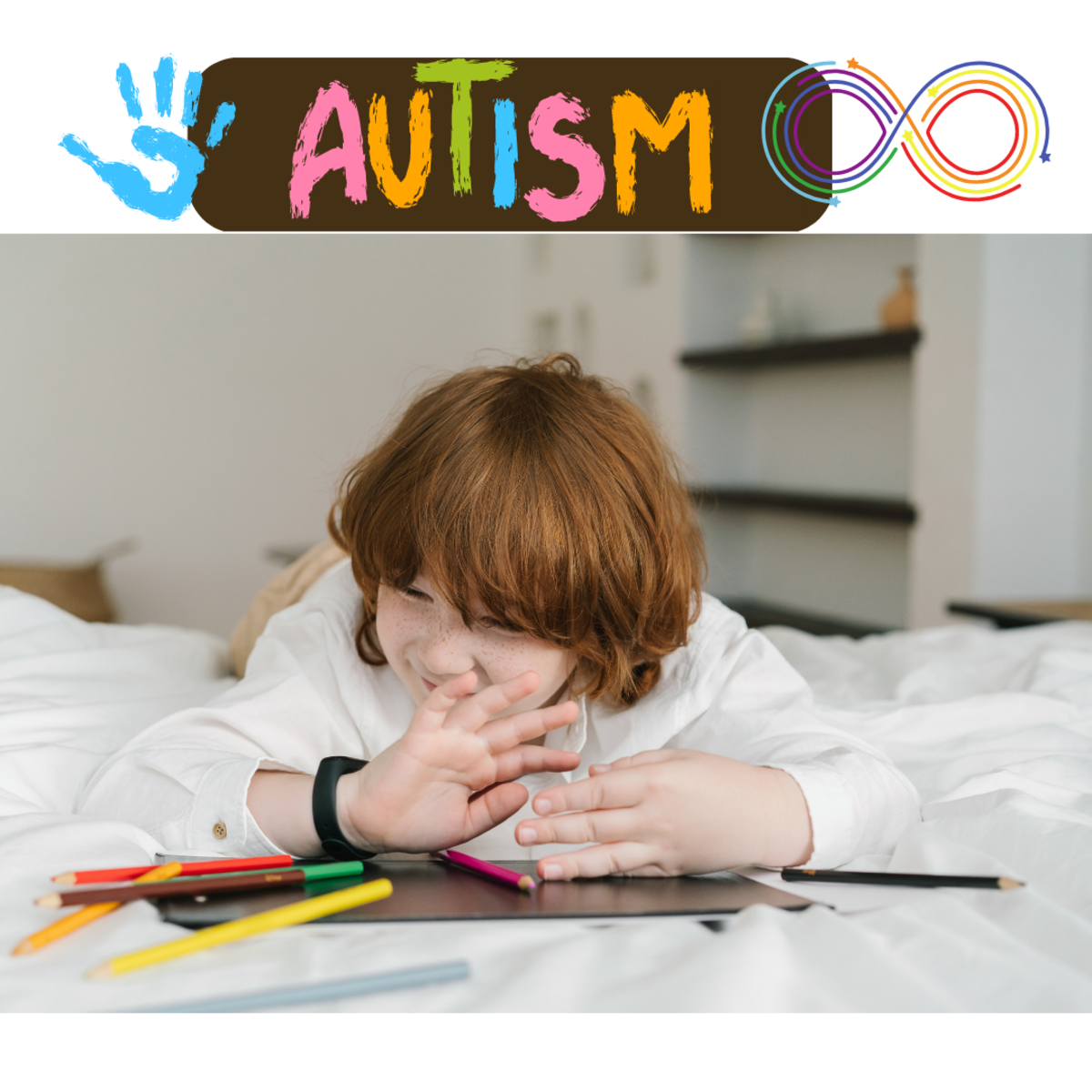- HubPages»
- Health»
- Diseases, Disorders & Conditions»
- Autism & Asperger's Syndrome
Interview with Autism (Pervasive Developmental Disorder): Life on the Side of a Parent
Pervasive Developmental Disorder? Is it really a Disease? Is it really Autism?
Many times children with Autism are easily overlooked as children with behavioral problems. Many times these children are misdiagnosed or not given everything they need for a proper individualized educational plan. No one knows the struggles more than the parent who has to advocate for their child. This article aims to show:
- Demographics of a Special Needs Child
- A transcript of an actual interview with a parent who has advocated for their child for years
- Struggles are on everyone involved, but there is help to those who are adamant about finding the help their individual child needs.
Demographics
Name of person you are interviewing
Susan (name changed to protect the anonymity of the parent)
Name of individual with the disability
Zach (name changed to protect the anonymity of the parent)
Describe the disability
The following are the disabilities that the individual has: Pervasive Developmental Disorder, Turrets, Attention Deficit Disorder, and Oppositional Defiance Disorder.
Zachary falls under the autism spectrum he tends to have extreme mood swings which are similar to being bipolar, he does not understand social situations as a normal 11 year old child, he has ticks that are very noticeable, and he will become very violent if he feels as if he is being told to do something he does not want to do.
Age of the individual with the disability
Eleven years-old
Describe the relationship between the family member and the individual with the disability
The family member, Susan, is the mother of the individual, Zachary, with the disability.
Zachary Lives Life to the Fullest

Interview
How did you learn that Zachary has a disability? (Who was present? When did this happen?)
Since Zach (Zachary) was born, he always had difficulties, even in daycares, with the teachers and the students. I knew something was off. I took him to a child psychologist when he was 5, and they went through a list of questions for me, and provided Zach a bunch of tests to see how he reacted. The psychologist originally stated that he just had ADHD. Then over the course of 5 more years, and many more problems with schools and IEPs, I took Zach to nine different therapists. Finally, I was able to take him to the head of Neuropsychology for the University of South Carolina, and received all of his disabilities, which fit into why Zach did and behaved the way he did. It was very overwhelming as a single parent receiving this information.
If you were giving advice to professionals who need to explain to a parent that his/her child has a special need, what would that advice be?
This is very overwhelming. I would tell a provider to please speak slowly and use words that any person can understand. I heard a lot of gibberish when they were explaining the different disorders and had to google everything [laughs]. When they provided the brochures, I was even confused by those. They were written for the medical community. When providing a parent with such heavy news, they need to take the time to explain how this will change the child’s life, what to expect, and how to deal with different instances that may occur. I felt like I was going into this alone and blind.
How did you feel when you received the diagnosis?
I was scared. I did not know what most of these things were, in fact, I probably could not have spelt Pervasive Developmental Disorder when I was told about it, and I had no idea it was within the autism spectrum. The wording was overwhelming. I had two other children at home who were young, and I was a single mother. It was terrifying about how this might affect my child, how people might treat my child, how my other children might feel, and if I would even be able to keep my job because of all of the therapy the therapists were suggesting for him. It was the scariest moment of my life, because I was entering into the unknown with no real support system in place to help with his behavioral and emotional disorders.
Have your feelings changed since the initial diagnosis?
I would lie if I said things were no longer scary or unknown. But I did find a psychologist to begin to explain his situation, and who takes me in for a portion of each session to provide suggestions on current behavioral problems. Luckily, I was able to have the school district provide an advocate to walk me through the IEP process to help make sure my child would still receive the information in school needed to graduate, just in a way that was best for him. My other two children learned to adapt, and I brought them to some family sessions where the psychologist was able to explain in simpler terms what we [as a family] would be experiencing. Once the initial shock wore away, and a medical regiment, and IEP were in place, things have become normal, or at least as normal as they will be for our family. There are still times we have to leave a place because of his hyperactivity or defiance to officials, but my children were walked through the situation, and I have been provided with new sorts of support groups and literature that helps a family cope with a change in their life because the child has a disability.
What have been the positive aspects of having a child in the family with a disability?
When you have a child with a disability, it really is hard to think of a positive aspect, but I am deeply grateful to have a healthy child in all other ways except for his emotional and behavioral disorders. My other children have learned compassion towards others. My daughter has started volunteering her time tutoring children with behavioral problems, because she has spent the past eleven years of her life having a sibling with so many disabilities and slowly becoming aware of injustices these children have each day of their lives. I have become an advocate for other parents who are scared and alone in the process, and I have met many new people through my child’s disability. When you have a child with any disability you become connected to others, and you become sort of a family.
What have been the problems or challenges you have experienced having a child with a disability?
Unfortunately, there have been many, many problems experienced. I have experienced fighting to keep my job because of all the time I had to take off to go to his [Zach’s] school for IEP meetings or to pick him up because the school could no longer take care of him. My other children have had to adjust their lives and know that sometimes there are things we just cannot do or have to make amendments to when we go out, just in case he [Zach] has an outburst. As a family we have ran into the problem of just how to speak around Zach. We had to learn what certain trigger words were for him and stay away from those. Also, the family has had to make changes about how they speak to Zach. He lacks many social skills which can be very frustrating to the older siblings who are used to being able to speak with someone and the person understand them immediately. With Zach, he can be considered lazy by the children, but they do not fully understand that his social and cognitive skills are not up to what his age actually is.
How did your other children react to learning his/her brother/sister had a disability? What impact has Zachary had on them?
My children have had to change their normal routines. They were very upset at first, and wondered why he had to have a problem that messed up their fun and their lives, but as the children grew so did their understanding of Zach’s problems. He has had a major impact on my daughter who is 4 years older than Zach, and my son who is 8 years older than Zach. Family vacations have changed to make sure Zach is happy, to avoid uncontrollable atmospheres. My daughter has had to take the role of teaching Zach after he has been taught a lesson at school when he does not understand it, because she has been the only one he does not see as an immediate threat but will listen to because she is not an authority figure. It has been a lot to ask of my children, but they have dealt the disabilities gracefully, and this has certainly provided them a lesson in gratefulness and being there for others.
What kinds of support have been most helpful to you? (family members, parent groups, neighbors, other?) How would you prioritize your family needs and the areas in which you feel that you need more assistance?
I have found that the most support I have received have been from other parents I have met that have had to go through IEPs like I have. The parents may have children with completely different problems but we are all connected by having a child with a disability that causes the child to be looked at differently. I have also found support groups at various churches held in the community that help with dealing with children with disabilities. My family has ultimately been my rock though. Once they were able to understand that Zach truly had a disability and was not just being a ‘brat’, they became very supportive.
Family needs are difficult to manage. I miss a lot of work due to meetings for Zach, so medical bills come first, but luckily the state will come in and pay for his medications. I need more assistance in finding people who will provide Zachary with additional tutoring because they tutor him once and his disabilities are too much for him. I also find it hard to find time to devote to my other children. My daughter is highly involved in theater in school, and Zach will not sit through a play, so I have had to miss some of her work due to the lack of help for Zach. Disabilities affect families and the child, and it is a hard balancing act as a single parent.
What have been your experiences in working with school personnel? What have they done that has been most helpful? What have they done that was least helpful or even harmful?
Working with the school district has been an absolute nightmare. They are not advocating for the children. With the exception of one person who works as a personal advocate on her own volunteered time, the schools act as if IEPs are a hassle. Teachers treat the student differently, and not in a good way because they have to change up their schedule. The school wants to fight tooth and nail about everything. I finally was able to get a shadow for Zach. The shadow was the best thing for him because they were able to deescalate a situation before the teacher or students were interrupted or I had to go to the school to get Zach. The school personnel treats students, especially with behavioral disabilities, as if they are lepers. I really hope this is not the way the children are treated in every school district, but this school district is impossible to get your point across with, and it is supposed to be one of the best in South Carolina, which is not saying much since the education system in South Carolina is lacking in many areas.
How could the school help your child transition to adulthood?
The school could begin to treat Zach as if he is a part of the school community rather than a child they have to provide an education to. The school conveniently does not let Zach take courses at the technical school, which could be giving him a skill he can work towards for a job once he graduates. Zach is young at the moment, but certain technical classes such as the botany and farming classes could help benefit him. At the moment, they are trying to teach him to be on the certificate track when he reaches high school. They could do whatever is possible in order to put him on the diploma track. Zach has trouble paying attention in class, but he has never had any extra help as if he has had a learning problem.
If I were to be Zachary’s teacher next year, what advice would you want to give me so that he/she has an optimum learning experience?
Please be patient with Zach. He works best if you give him an option of two things that need to be done instead of telling him he has to do a certain type of work. When it comes to tests provide a quiet space for him, which should be in his IEP. Zach feels less stressed in a quiet environment and stress is a trigger of many of his problems, as well as his turrets affects the students, because stress affects this as well. When you have a problem with Zach, speak to him slowly and calmly and explain why he is being reprimanded. Then provide a choice of his punishment. He is more likely to go through with the punishment without objection when he feels like he has some sort of control of the situation. He also works best when he sits close to the teacher, and has further distance from other students, because of his lack of social interaction skills being on the same level as the students he is in the class with. And above all else, please keep me updated about what is occurring with Zach, either daily or weekly, phone or e-mail. This will help address issues he may be having at school at home so further stress can be taken off of you as the teacher and allow the student to
What would you want me to do/not do in terms of my interactions with you if I were Zachary’s teacher?
I would prefer you contact me when there is a problem rather than let it escalate to a problem that cannot be fixed. I would like to be in the loop when curriculum changes, so I can give Zach a heads up, which helps him keep a routine and keeps from disturbing what he expects each day at school. I would prefer not to be called each time Zach has a tick or uses foul language, which is a form of turrets, due to the nature of my job, but I would like to stay in the loop through a newsletter or some way of updating me on Zach’s process each week. This way we can look back at the progress to see why he is and is not succeeding in certain areas of school. I would prefer disruptions to try to be handled by the teacher, instead of calling a vice principal or principal each time there is a disruption.
I am just learning about students with disabilities and how to work effectively with them in my classroom. What other information would you like me—and my classmates—to know about working with children with special needs?
Every student with a disability has a different need from their teacher. When you are dealing with these students, please use patience, and some tender care with them. These students come from some of the poorest and most affluent of areas, but it comes down to they have some sort of disability that is hindering their learning. If you pay attention to how the child learns, collaborate and communicate with the parent, and use the discipline higher-ups like the principal sparingly, many students are going to gain a greater respect for you. Children with special needs need special care. Please make sure you supply that care to these students, and don’t leave them out of activities or give them small tasks. Their IQs could be very high, and their social skills could need assistance. Please pay attention to the IEPs and work with the parent. As a parent, I respect and go above and beyond to work with my child and my child’s teacher when they make the attempt to do everything they can for my child. Children with special needs are a difficult task, but the love and care they are exert is worth every moment that may be frustrating.
Summary
After completing the interview with the mother of Zachary, I realized how frustrating IEPs and coordinating with teachers about the specific child can be. Furthermore, the children are being excluded. The children should have more inclusion, discipline should be tailored to the type of disability the child has, the child should be diagnosed as early as possible which can help with possible learning impairments, and small team based learning to improve his social skills.
Inclusion is the first problem, however, there is a certain strain on a classroom that has inclusion. Inclusion or “mainstreaming” students can have a large impact on students as well as teachers. Tension ultimately arise, which can cause for a more hostile environment (Florian, 2008). It is important for this child to go into the less restrictive classroom as suggested by Hallahan, Kauffman, and Pullen (2015), his learning experience and well as those in his classes may have been different. Even as a parent I would want what was best for my child, and inclusion is not always the best answer for the child. The classroom can be overwhelming, and I’ve seen firsthand how seeing the “normal” children interact can affect the psyche of the child that has been included. Inclusion in a simpler environment, such as an extracurricular such as art or drama may be the best way to mainstream a child with disabilities, like Zachary, while still maintaining the integrity of a curriculum that is best for Zachary as well as the other children within the school.
Discipline is the foundation to understanding the rules and regulations of a working society. When a child reaches adulthood, it is necessary for the child to be able to transition into society. There are rules and regulations at jobs and everyday living; there are laws to abide by, and repercussions if they are broken. This would be an excellent area that would help Zachary transition into the world outside of school. Proverbs 15:32 states, “Whoever ignores instruction despises himself, but he who listens to reproof gains intelligence.” With a strict, organized regiment in the classroom, children are able to enter an environment in which they know what is expected of them and the exact repercussions to their actions. This organized atmosphere helps maximize the child’s learning potential. Kang (2013) states that Ur (1996) found that discipline helped to provide “smooth and efficient teaching and learning in the lesson.”
Hollo, Wehby, and Oliver (2014) proposed that children diagnosed with emotional and behavioral disorders (EBD) often have language deficits that are overlooked. The types of learning impairments include: comprehensive, receptive, expressive, semantic, and syntactic. By recognizing if Zach has an EBD, the teacher may in turn not fault the Zach but rather look at him more positively and work with his learning impairment in conjunction with his disability.
In a study by Kent (2015) there were three to five students in a pee group, in which inclusion took place which included students with and without disabilities. It was determined that team-based learning was beneficial overall. This is because the students were able to repeat the content vocabulary and use it in a context in which they were required to expound on the content, which helped the students understand what was occurring better than creating notes or rote memory. This could be a beneficial teaching mechanism for Zachary’s emotional and behavioral disabilities because it will create small groups in which he can practice social skills without being overwhelmed and still finish the work required by the teacher without feeling as if he is being singled out.
References
Florian, L. (2008). Inclusion: special or inclusive education: future trends. British Journal of Special Education, 35(1). 202–208. doi: 10.1111/j.1467-8578.2008.00402.x
Hallahan, D., Kauffman, J., & Pullen, P. (2015) Exceptional learners: an introduction to special education (13th ed.) Upper Saddle River, NJ: Pearson Education, Inc.
Hollo, A., Wehby, J. H., & Oliver, R. M. (2014). Unidentified language deficits in children with emotional and behavioral disorders: A meta-analysis. Exceptional Children, 80(2), 169-186.
Kang, D. (2013). EFL teachers' language use for classroom discipline: a look at complex interplay of variables. System, 41(1), 149-163. doi:10.1016/j.system.2013.01.002.
Kent, S., Wanzek, J., Swanson, E. A., & Vaughn, S. (2015). Team‐Based learning for students with high‐incidence disabilities in high school social studies classrooms. Learning Disabilities Research & Practice, 30(1), 3-14. doi:10.1111/ldrp.12048
The Holy Bible, New International Version.








